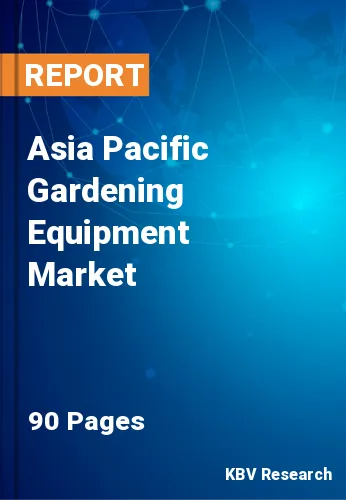The Asia Pacific Gardening Equipment Market would witness market growth of 5.7% CAGR during the forecast period (2022-2028).
In the next few years, the increased popularity of battery-powered ergonomic design tools is expected to support market expansion. Gardening is a physically demanding pastime that involves digging holes, trimming small plants, and edging out weeds, all of which can result in repetitive stress injuries. Improper garden tool use, particularly by older persons, can cause unnecessary strain and soreness in numerous human body parts such as the knees, back, and wrists. This fuel the demand for ergonomic design tools among amateurs, enthusiasts, and expert landscapers, boosting market expansion throughout the projection period.
The oldest agricultural equipment were the forerunners of today's garden tools. Axe, sickle, pitchfork, scythe, and shovel are just a few of the hand tools that are commonly used in gardening, particularly at home. Because of their improved and effective performance, power tools are widely used in both the business and domestic sectors.
The increased demand for gardening equipment in the region will be aided by the increasing adoption of technology in regional countries. Government-led eco-city development projects are predicted to boost the gardening equipment market ahead in China. The increased adoption of robotic models with connectivity as well as smart features such as navigation and lawn mapping, as well as the growing interest in backyard beautifying and the debut of models with ease of use, are providing numerous benefits to Chinese gardeners.
Furthermore, countries such as India are experiencing growing urbanization. Cities host over 31% of India's current population and contribute 63 percent of the country's GDP, according to the Indian government's National Portal of India. Urban areas are expected to contain 40% of India's population and create 75% of the country's GDP by 2030. As a result, a comprehensive physical, institutional, social, and economic infrastructure is required. All of these variables work together to improve quality of life while also attracting people and investment, resulting in a virtuous cycle of growth and development. The development of smart cities is a step in that direction. Parks are being developed in the cities by the government to give children and adults alike green spaces to play and enjoy nature in.
The China market dominated the Asia Pacific Gardening Equipment Market by Country in 2021, and would continue to be a dominant market till 2028; thereby, achieving a market value of $9,957.1 million by 2028. The Japan market is poised to grow at a CAGR of 5% during (2022 - 2028). Additionally, The India market would display a CAGR of 6.3% during (2022 - 2028).
Based on End use, the market is segmented into Commercial/Government and Residential. Based on Product, the market is segmented into Water Equipment, Lawn Mowers, Handheld Power Tools, and Hand Tools & Wheeled Implements. Based on Sales Channel, the market is segmented into Lawn & Garden Specialty Stores, National Retailers & Discount Stores, Home Centers, E-commerce, and Hardware Stores. Based on countries, the market is segmented into China, Japan, India, South Korea, Singapore, Malaysia, and Rest of Asia Pacific.
Free Valuable Insights: The Worldwide Gardening Equipment Market is Projected to reach USD 114 Billion by 2028, at a CAGR of 5%
The market research report covers the analysis of key stake holders of the market. Key companies profiled in the report include Robert Bosch GmbH, Honda Motor Co. Ltd., Deere & Company, The Toro Company, Fiskars Brands, Inc., Husqvarna Group, MTD Products, Inc., Falcon Garden Tools Pvt. Ltd., AriensCo, and Briggs & Stratton, LLC.
By End use
By Product
By Sales Channel
By Country
Our team of dedicated experts can provide you with attractive expansion opportunities for your business.

